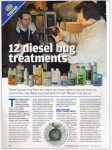ChromeDome
Well-Known Member
I have it as pdf but is is 22mb, too big for sharing here.
PM me your email address and I'll send it over.
Get it here
DieselAdditiveTest.pdf | Powered by Box
1st page:

Get it here
DieselAdditiveTest.pdf | Powered by Box
1st page:

Last edited:
